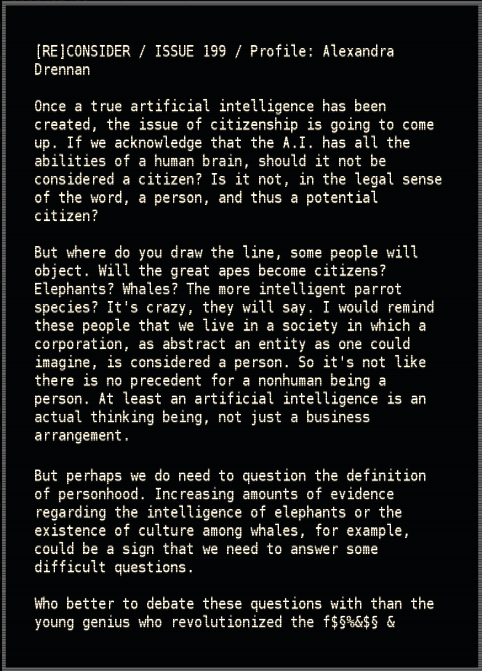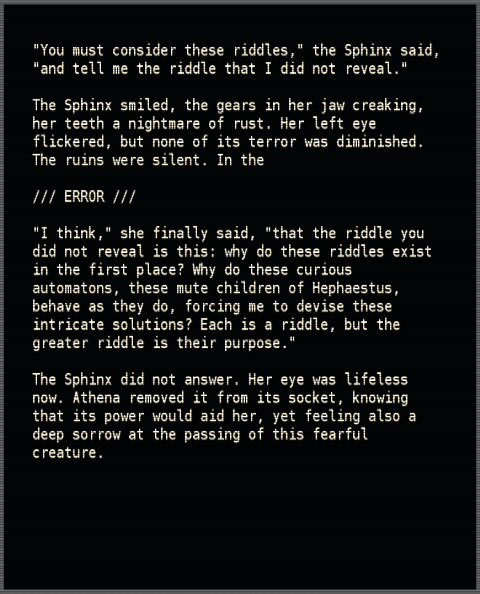|
It might be worth noting that Faith's full name is 1w/Faith, i.e. "one with faith". Which seems a bit more gender-neutral than just Faith on its own.
|
|
|
|

|
| # ? Apr 27, 2024 05:16 |
|
Paul.Power posted:It might be worth noting that Faith's full name is 1w/Faith, i.e. "one with faith". Which seems a bit more gender-neutral than just Faith on its own. True, but when I hear Faith as a name in a video game it reminds me of Mirror's Edge's female protagonist.
|
|
|
|
How about the concept of shame? Are there any animals that get embarrassed for being nude or whatever might trigger such a response?
|
|
|
|
For me, a person is a thing that is conscious. What is consciousness however, who the hell knows. Is it the same as self-awareness? Are you a person when you're sleeping? 
|
|
|
|
Okay, here's my shot at it. A person is an entity capable of feeling frustration at being asked to define what makes a person a person.  If you want to define "human" that's easy. A human is a member of the species Homo sapiens sapiens paragon1 fucked around with this message at 21:23 on Feb 3, 2015 |
|
|
|
Ardryn posted:How about the concept of shame? Are there any animals that get embarrassed for being nude or whatever might trigger such a response? Yes. I'm quite sure apes can show shame in a very similar way humans do. And even cats can do it, in a sense. Just look at one making a mistake. Like, it runs towards someone thinking it's gonna get fed, but then that person is someone else. The cat will stop mid-run, sit there, and starts "nonchalantly" cleaning its face. 'Nobody saw that, right? I wasn't doing anything stupid, I just thought this was a nice place to clean myself.'
|
|
|
|
I remember reading somewhere that feline self-grooming is kind of their default action if they're unsure of what to do. I don't know if it's as much "what, I'm just cleaning myself, that's obviously my intent" as "hang on, let me clean myself for a bit while I get my thoughts together".
|
|
|
|
Ardryn posted:How about the concept of shame? Are there any animals that get embarrassed for being nude or whatever might trigger such a response? Well, shame is mostly a societal construct, particularly shame that comes from nudity. My niece sure as hell didn't have a concept of shame at the tender young age of 2. Animals definitely don't have a concept of nudity because why would they? But depending on your definition of shame, dogs are bright enough to understand when they do something that will bring reprisal on them, and I've seen some dogs act ashamed when they're caught.
|
|
|
|
What about "Human beings can tell jokes"?
|
|
|
|
LoonShia posted:What about "Human beings can tell jokes"? What do you get when you cross a fragrance with an actor? A smell Gibson. That joke was written by a computer.
|
|
|
|
Kurieg posted:This was basically what the Buggers were in Enders Game. The drones and such aren't really sentient, existing mostly as extensions of the queen's will. The formics saw the deaths in the war with humanity as basically the equivalent of the skin flakes you lose when you shake hands. Once they realized they were killing individual sentients they retreated back to their home systems and hoped humanity wouldn't be able to retaliate, or would understand their mistake. It's also an interesting take on things because it's a "What measure is a person" from the opposite side. This alien race had no idea that individual organisms could be sentient, when exposed to the reality of the situation they were forced to reevaluate their views. There's also Blindsight, which has another take on first contact and intelligence vs consciousness. Mankind is an anomaly in actually being conscious. Everything else turns out to be a bundle of very clever reflexes, and the first contact message got interpreted as a virus - without the need for language, trying to parse nonsense takes up resources.
|
|
|
|
Oh, I forgot about Blindsight. Everyone interested in this kind of stuff should read it.
|
|
|
|
Plus, it's free under creative commons.
|
|
|
|
LoonShia posted:What about "Human beings can tell jokes"? A program has been written that can identify appropriate moments to interject with "that's what she said".
|
|
|
|
Anticheese posted:There's also Blindsight, which has another take on first contact and intelligence vs consciousness. ... omeg posted:Oh, I forgot about Blindsight. Everyone interested in this kind of stuff should read it. Also Echopraxia, Peter Watts writes some interesting books. They're good. Read them.
|
|
|
|
I have read a book called "The most human human" by Brian Christian. Edit: It has also occurred to me that it may be counterproductive to try to define something as vague as "person", which is in practice synonymous with "human" which is defined as "Homo sapiens sapiens" (as mentioned above), that is, by examples instead of properties. On that note, if "person" weren't synonymous with H. sapiens sapiens (and defined by cognitive properties), I'd imagine it would be possible to leave out some H. sapiens sapiens from the category "person". supermikhail fucked around with this message at 11:55 on Feb 4, 2015 |
|
|
|
omeg posted:For me, a person is a thing that is conscious. What is consciousness however, who the hell knows. Is it the same as self-awareness? Are you a person when you're sleeping? What the hell is consciousness indeed? This has been a fun question over the centuries since we started seriously asking that question and writing down the answers, and the discussion on the subject is actually quite fascinating! paragon1 posted:Okay, here's my shot at it. Those are actually both good answers, one of which I think we can put in the "Unsure, but a fairly safe bet", and one of which we can put in "Yep, that's definitely something humans are called right now, although Ian Stewart and Jack Cohen would prefer you say Pan Narrans" Which leads to the one I was saving up from Science of Discworld Humans think Narratively - While this one is under "Unproven until we understand whether Dolphins, Ravens, etc, actually have complex language and abstract thought", it's actually a really interesting take on things, and the writers argue it quite persuasively. The essential basis is that we, human beings, define ourselves, what we perceive, and our actions in terms of stories, leading to goal based thought ("This is the ideal ending to the story of 'How JamieTheD Got A Real Job', and here's how we're going to get there."), teachings of moral perspective according to our culture ("The story of how the Big Bad Wolf is actually about sexuality, and why you should avoid creepy guys who identify with the BBW"), and also our prejudices we gained from said teachings ("The story of why X person is out to destroy my enjoyment of life because of Other Stories From Childhood A,B, and C, and why I must hate them."). It's obviously a fair bit more complex than that, with its own pros and cons as a hypothesis, but that's the basis, and I do actually like this one. Sequential tool use/creation was also mentioned by ViggyNash, and while there has been at least one example of a Raven using tools sequentially, logically reasoning out the steps, and then using a wire to reach a longer wire, to reach a longer wire, to reach food, it's the only example I could find that even comes close. But be aware that this does suggest that thinking animals are capable of it, only using it when they really need to. So while ViggyNash has raised a good example, it may not be completely unassailable as "unique" to humans if a future example crops up. This is some good discussion, folks, really enjoying it! EDIT: Oops, the first one was restated, sorry! JamieTheD fucked around with this message at 20:05 on Feb 4, 2015 |
|
|
|
supermikhail posted:I have read a book called "The most human human" by Brian Christian. That Radiolab episode I linked earlier was an entire hour based on that book. Its good stuff and people should go listen to it.
|
|
|
|
Talking about books that cover this kind of thing, there's the Cassandra Kresnov series by Joel Shepherd. It's not even half as deep as most of the stuff brought up so far, but it raises its fair share of interesting points and is quite fun to read. Cassandra is an artificially created human, with an entirely synthetic body capable of many magnitudes more than a normal human. Created with only a single purpose in mind, a tool for war, once she grows older and a few incidents help point her way she realizes that she really doesn't like the people she's fighting for. She decides she would much rather disguise herself as a regular human among her former enemies, people who consider her nothing more than an abomination, not worthy of life let alone the designation of being human. Later books in the series take another step in that direction and dip into what may happen if the synthetic outlive their creators. I really hope there's more in the series, the last bit really fascinates me and it only really pops up in the last book.
|
|
|
|
If you don't believe that ravens are capable of relatively complex thought, watch this interesting experiment, that gets more and more complex as the video goes on. https://www.youtube.com/watch?v=ZerUbHmuY04
|
|
|
|
 Part 5 (Hub A-5): Breaking the sequence EL.html; AI_citizenship.html; athena8.txt    Stuff to break the ice at parties: - Would the Long Library work for setting up a new civilisation? - Are there any other organisations with similar philosophies and if not why? - Seriously, what could someone do with infinite iterations of themselves? Did Bill Murray have to be confined to a single town or would he have eventually worked out how to create a propeller engine from sourced parts consistently in half an hour?
|
|
|
|
The idea of the white paint is, that you can read every message a member of your steam friends list put up. Those messages are a little bit to limited though.
|
|
|
|
You do get more messages as the game goes on, though. The one you saw from yourself that you didn't write (which is odd) is one you get for going out of bounds like you did in the video, except most players will probably do it by going for a swim on an island level; the same speech plays for any time you reach the edge of the playing area, whether you should be able to or not. From the Sigils of Elohim minigame, you can get three messages that brag about how good you are at sigil puzzles. I am not, so I never painted those.
|
|
|
|
The two Faith messages in that last puzzle have different version numbers. Either the programs are being hotfixed mid-test, or multiple Faiths have come through. I'm not sure which one would be more interesting.
|
|
|
|
|
Heatwizard posted:The two Faith messages in that last puzzle have different version numbers. Either the programs are being hotfixed mid-test, or multiple Faiths have come through. I'm not sure which one would be more interesting. That message from "yourself" (v99.45.0013) was also a different version than the one you posted in the help shrine (v99.44.0014b). The confusing thing is that it looks like the "yourself" message came from a later version (45 compared to 44), though if you take the last 4 digits, then your current version is higher (0014 compared to 0013).
|
|
|
|
Heh. Citizenship for animals. Not as far fetched as you'd think, but it would be contingent on several things, many of which our society just isn't very good at. At all. The "easiest" step is to first establish lines of communication. This has been done to a very limited extent, but we are a long way from understanding "higher" animal vocalisations. We know that ravens, to come back to one of our limited pool of contenders for sentience, have specific calls to warn other ravens about people they don't like (Another sign that Ravens are very likely capable of higher thought processes... They're neurotic as hell. Ask anyone who works with them regularly), but actually talking to them? Nope. Thing is, that's only the first step. The next step is much, much harder. Because it gets back to this "Oh, we're so special!" sentiment we, as a species, seem to have... ...We would have to grant them legal rights. For anyone who thinks "Well, obviously we'd give them rights once we found out they were smart!", I'd just like to point a little thing out. Namely, that we have a terrible track record when it comes to giving our own fellow human beings legal rights and enforcing them. Last year especially provided quite a few examples of how we're definitely not very good at that, although it doesn't take long to find human rights abuses in any given year with a number in it (When humans existed and wrote things down, obviously.) It also isn't a single "Yes, you now have all the same rights" type event. It would, just like anything to do with civil rights, most likely be a long, drawn out process, with much heartbreak along the way. Finally, we would have to accept them as fellow sentient beings, with all that implies. As equals. You'd think this would come first, but no, again we have a terrible track record with accepting that yes, those people who are slightly different to us have the same potential as we (Perfect as we see ourselves or not) obviously do. CannibalK9 posted:Stuff to break the ice at parties: As to this, the answer would most likely be "No", sadly. See, we've used a lot of basic resources over the centuries... Wales, for example, doesn't have that much easily accessible coal/anthracite anymore, and that's a basic ingredient in quite a few basic metallurgical endeavours. We've deforested a fair bit (A lot of it on our way up to the current level of tech), so... Knowledge, while useful, wouldn't get us the whole way back to spaceships and computers and the like. At least, as far as I am aware.
|
|
|
|
I would totally be down to shoot the poo poo with some smart birds that can communicate as we do. Or to make friends with a sentient robot.
|
|
|
|
Haha, that discussion about the hexahedron was truly goons.txt. Anyway, the Long Now thing somewhat reminds me of the Pioneer plaque and the Voyager record, the "messages from humanity" sent into space alongside those research probes. The Pioneer plaque contains this binary code that is defined by a certain basic energy transition of the hydrogen atom, that any species with some knowledge of physics should know. This way, all other numbers are defined. For instance, those lines coming from a point show the distance and direction of the stars close to the sun. They thought quite some time about designing something any intelligent species should be able to decode. I am not sure if it's enough. Anyway, even if it's ever found by an intelligent species, it'll probably be loooong after the earth is gone. Space is big and it takes a long time getting anywhere. So in a sense, the designers of the plaque are thinking about a much longer 'now' that the Long Now foundation. It's expected that if humanity goes extinct, most evidence that we ever existed will have disappeared from the surface in a few thousand years at most. Nature takes over quickly. But stuff in space lasts nearly forever. Space is a good place for record keeping. The biggest criticisms on the Pioneer plaque were the arrow showing the route of the spacecraft. Arrows are meaningless for species without a hunting history, critics claim. And the fact that the people are shown nude. Some people are simply prudish, but you could ask yourself the question whether nudity is truly the basic form of modern humans. We wear clothes instead of animal's fur. A bald dog looks unnatural, too. Wouldn't it be better to show aliens a picture of how we are in daily life. The Voyager records attempted to do that. They are made of durable gold. The backside contains the same binary code as the Pioneer plaques, and also basic instructions on how to build a phonograph and play the record. The record itself contains music, sounds of nature, scientific diagrams, and photos of earth, nature and humanity. I don't really believe these things will ever be found by another species. It's more likely that in a thousand years, our descendants will catch up with them with fast spaceships and put them in a museum. It's interesting to think about, though. JamieTheD posted:As to this, the answer would most likely be "No", sadly. See, we've used a lot of basic resources over the centuries... Wales, for example, doesn't have that much easily accessible coal/anthracite anymore, and that's a basic ingredient in quite a few basic metallurgical endeavours. We've deforested a fair bit (A lot of it on our way up to the current level of tech), so... Knowledge, while useful, wouldn't get us the whole way back to spaceships and computers and the like. At least, as far as I am aware. Well, unless the new civilisation comes into being long after the scope of the Long Now. A few hundred million years and there'll be coal again (depending on earth's geological/biological future, of course). If time stops being an issue, there's barely any resource that's absolutely non-renewable. Carbon dioxide fucked around with this message at 01:17 on Feb 6, 2015 |
|
|
|
Finally finished a 100% run!  Let me just say, to keep Cannibal motivation, that this game only gets better and better as it goes on. The best really is yet to come. e: And for those who want to know, a 100% run took me 29 hours, though granted I cheated on a few of the stars and sigil puzzles, one of which I cheesed and never looked up how to do as intended. 
ViggyNash fucked around with this message at 01:24 on Feb 6, 2015 |
|
|
|
JamieTheD posted:Heh. Citizenship for animals. Not as far fetched as you'd think, but it would be contingent on several things, many of which our society just isn't very good at. At all. It also doesn't help that none of our societies have any sort of real framework for dealing with a different species that shares the quality of sapience with us. Taking ravens for example. What rights would they actually need? And what obligations should come along with those rights, if they can even understand those concepts? Will they have to follow the law? Are we going to start putting smart birds in jail when they eat someone's grain (or a corpse)? I don't know much about the Long Library, but from what was mentioned a few issues stand out to me. 1) 10,000 years is a long time, but it isn't that long (or is incredibly short) on a lot of timescales. It may simply not last long enough. 2) Issues with language. We haven't got the slightest of clues what people sounded like ten thousand years ago, and if they had had writings at the time we probably wouldn't be able to decipher them. People commonly believed that we would never be able to translate the old hieroglyphs of Egypt for a quite a while. It's why the Rosetta stone was such a big deal. 3)How can you be sure someone would even find the thing?
|
|
|
|
Carbon dioxide posted:The Pioneer plaque contains this binary code that is defined by a certain basic energy transition of the hydrogen atom, that any species with some knowledge of physics should know. This way, all other numbers are defined. For instance, those lines coming from a point show the distance and direction of the stars close to the sun. Carbon dioxide posted:The Voyager records attempted to do that. They are made of durable gold. The backside contains the same binary code as the Pioneer plaques, and also basic instructions on how to build a phonograph and play the record. The record itself contains music, sounds of nature, scientific diagrams, and photos of earth, nature and humanity.
|
|
|
|
I wanted to point out that there's a difference between the Talos Principle and the Talos Project. The recording we heard in this area was about the Talos Principle, which we first heard of back in A-2, which is about how even the most faithful philosopher cannot live without their blood. I also wanted to mention that Corporate personhood is an actual thing right now, mostly just in the USA, just for those that weren't aware.
|
|
|
|
For another sci-fi singularity story, Charlie Stross' Accelerando (I'm probably spelling it wrong) is free, and involves sentient corporations.
|
|
|
|
paragon1 posted:2) Issues with language. We haven't got the slightest of clues what people sounded like ten thousand years ago, and if they had had writings at the time we probably wouldn't be able to decipher them. People commonly believed that we would never be able to translate the old hieroglyphs of Egypt for a quite a while. It's why the Rosetta stone was such a big deal. Linear A and B come to mind, unless I'm behind the times and people have made progress on one of those. Onean posted:I also wanted to mention that Corporate personhood is an actual thing right now, mostly just in the USA, just for those that weren't aware. The problem with corporate personhood in the context of this debate is, without getting into politics any more than necessary, that it's kind of a weird tangent with a relevant-sounding name that doesn't actually have anything to do with the question at hand. It's not really asking the question "what makes a person, really, when you get down to it," so much as it's asking, "this is loving complicated, is there a way we can make this easier on ourselves?" 'S'right in the wikipedia article even. So I mean I guess you could call it precedent but contextually it seems like more of a distraction than anything helpful or meaningful.
|
|
|
|
Haven't watched the episode yet, but unfortunately read the thread. And I've pondered a relevant idea for a while: ravens and such may not be fully sentient right now, but we seem to have the means to make them so. Wolud it be ethical to breed different species for intelligence? Or even genetically manipulate them, such as in the case of octopi to prevent them from dying after breeding?
|
|
|
|
Dr. Buttass posted:The problem with corporate personhood in the context of this debate is, without getting into politics any more than necessary, that it's kind of a weird tangent with a relevant-sounding name that doesn't actually have anything to do with the question at hand. It's not really asking the question "what makes a person, really, when you get down to it," so much as it's asking, "this is loving complicated, is there a way we can make this easier on ourselves?" 'S'right in the wikipedia article even. So I mean I guess you could call it precedent but contextually it seems like more of a distraction than anything helpful or meaningful. This specific log is talking entirely about citizenship and what legally constitutes a person, so yeah, I'd say it's entirely relevant to it. Especially as it's used in a "Hey, corporations are legally a person, what's to say an A.I. can't also legally be one?" context. In a broader sense for the overall discussion, what exactly being a person requires, I'd agree that no, it doesn't really apply.
|
|
|
|
supermikhail posted:Haven't watched the episode yet, but unfortunately read the thread. And I've pondered a relevant idea for a while: ravens and such may not be fully sentient right now, but we seem to have the means to make them so. Wolud it be ethical to breed different species for intelligence? Or even genetically manipulate them, such as in the case of octopi to prevent them from dying after breeding? Well. the thing is, scientists did figure out a way to let the females survive after breeding. It involves blinding them so they can't tell that they've actually laid their eggs. The men die because their bodies just shut down after they've mated. And changing that would require heavy genetic re sequencing. The morality of uplifting is a common sci-fi trope, and it usually falls on the side of it being ethically wrong. Even if you're doing it with the absolute best of intentions you're still imposing your will on another creature, and probably your own morals and culture.
|
|
|
|
Except, of course, we impose our will anyway, but I suspect it's another idiosyncracy of human thinking that breeding for our own antibodies (or bodyparts) is more ethical than breeding for better mutual understanding. Edit: For additional points in cynicism I'm going to add that the opposition would likely be religious. supermikhail fucked around with this message at 08:37 on Feb 6, 2015 |
|
|
|
It's more imposing your will on another sapience, particularly one that did not exist before you created it. problems like "you created it, do you own it? is it your child? Does it count as human? Is it an experiment? Is it still ethical to do testing on it since it was unable to understand the concept of consent?"
|
|
|
|

|
| # ? Apr 27, 2024 05:16 |
|
But there don't seem to be any qualms with creating artificial intelligence. In particular, there's a place dedicated to mapping a complete human brain and recreating it with a bunch of computers. 
|
|
|



























